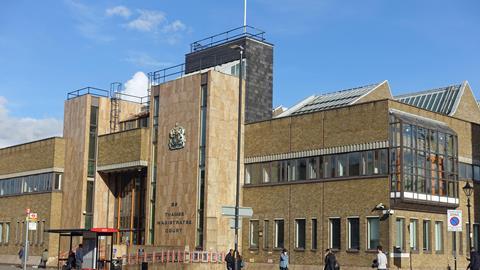Leaking ceilings, broken toilets, mould – these are just some of the observations highlighted in a shocking Law Society report on the state of the court estate. Today’s report is based on the findings of nearly 600 solicitors, who were surveyed on the court infrastructure. Nearly two-thirds of respondents said they experienced delays in cases being heard due to the state of the court within the past 12 months.
One solicitor said chairs and floors in a London crown court were being held together with gaffer tape, the ceilings were leaking, toilets were not flushing properly and there was mould everywhere.
Thames Magistrates’ Court (pictured above) was in disrepair, according to another solicitor: ‘The walls are falling in, tiles falling off, the roof leaks. The consultation rooms are not private and lots of seating is broken. Inside court 7 is particularly bleak. No air con. Often heating broken. Last year when sewage came up into the cells it took a day for it to be decided to close the cells.’
Another said of their magistrates' court: 'There are buckets collecting water from the ceiling. There is duct tape taping the carpet down. There is inadequate space to see clients and most of that is locked. The windows don't work so cannot be opened. The toilets are disgusting. Robing rooms are not fit for purpose with barely any desks to work at. If there is air conditioning, it doesn't work. Most have no catering facilities now.'
A solicitor ‘had a piece of an air conditioning unit fall on my head at a magistrates’ court a few years ago and the ceiling fan it fell from still hadn’t been mended when I last went’.
Disabled court users reported broken lifts and hearing loops not working.
However, some respondents reported positive experiences, which tended to focus on court staff, who were described as friendly, supportive, doing their best to help and working hard in difficult circumstances.
Port Talbot Justice Centre had multiple waiting areas, entrances and consultation rooms. Manchester Civil Justice Centre was described as a ‘modern, purpose built court centre. Bodmin Magistrates’ Court was a ‘reasonably modern building and on the whole, most things work’.
Society president Lubna Shuja said: ‘The poor state of court buildings across England and Wales is both a contributor to the huge backlog of court cases and a stark illustration of the lack of investment in our justice system… Decades of damage cannot be reversed overnight but urgent action can halt this decline before it’s too late.’
The Society's suggested action plan includes further investment in buildings, staff and judges, properly funded legal aid and better data collection.
A Ministry of Justice spokesperson said: ‘Last year we announced the largest funding increase for the justice system in more than a decade, solidifying our commitment to making sure it protects the public and supports victims.
‘We’ve digitised a raft of court services since 2016 and are investing £175m in court maintenance to ensure they are fit for the 21st century. We have also agreed substantial pay increases for criminal solicitors and barristers, with the latter set to earn around £7,000 more a year typically.’
The department said it spent over £175m on court maintenance and repairs in the two years to April 2023 and spending is prioritised to ensure buildings are safe, secure, meet statutory requirements and protect continuity of service. It is working closely with local judiciary and operational colleagues to identify and address the areas of highest maintenance priority.




























21 Readers' comments